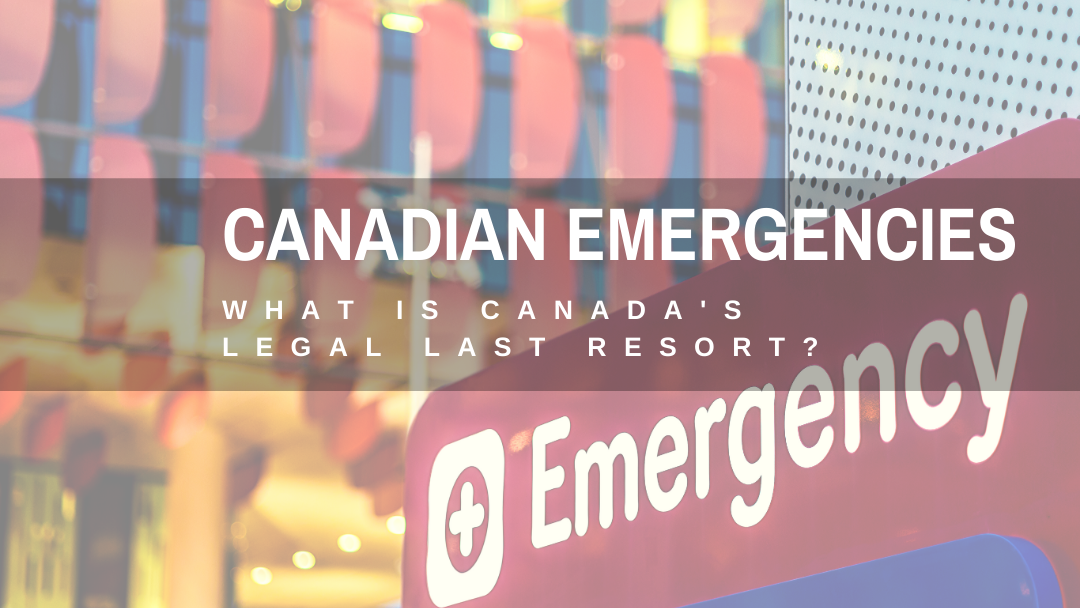COVID-19 Emergency states – What happens under the Emergencies Act in Canada

Last month, I released a post on the Quarantine Act, before the Quarantine Act was being used to enforce and make it mandatory for all travellers to self-quarantine. In the events of COVID-19, we have seen municipalities, regions, and provinces declare states of emergency. This is not the first time this has happened. Provinces in the past have declared emergencies during big snowstorms, floods, etc. For example, in 2016, Alberta declared a state of emergency to tackle the Fort McMurray fires, and just last year, the City of Ottawa declared a state of emergency for devasting spring flooding. Declaring an emergency allows the government to pass temporary emergency orders, such as the Ontario government closing non-essential businesses. Toronto declared a state of emergency and has passed a few bylaws during this COVID-19 pandemic to enforce social distancing, such as the two-metre rule at parks and quarantine for anyone who may have been in close contact with someone who has tested positive for COVID-19. But we have yet to see at the federal government declare an emergency. On March 25, 2020, Parliament enacted a new act, the COVID-19 Emergency Response Act, including the Canada Emergency Benefit Act, to provide financial support in response to COVID-19. This act includes increased tax benefits, temporary wage subsidies, loans, and more. Despite the provinces and cities acknowledging an emergency and the federal government providing an emergency response package, the federal government will not put the Emergencies Act into force at this time.
What does the Emergencies Act allow the federal government to do? The Emergencies Act covers four categories of emergencies:
1. The Public Welfare Emergency for emergencies related to:
(a) fire, flood, drought, storm, earthquake, or other natural phenomenon,
(b) disease in human beings, animals or plants, or
(c) accident or pollution

2. The Public Order Emergency for an emergency that arises from threats to the security of Canada and that is so serious as to be a national emergency. These threats are:
(a) espionage or sabotage that is against Canada or is detrimental to the interests of Canada or activities directed toward or in support of such espionage or sabotage,
(b) foreign influenced activities within or relating to Canada that are detrimental to the interests of Canada and are clandestine or deceptive or involve a threat to any person,
(c) activities within or relating to Canada directed toward or in support of the threat or use of acts of serious violence against persons or property for the purpose of achieving a political, religious or ideological objective within Canada or a foreign state, and
(d) activities directed toward undermining by covert unlawful acts, or directed toward or intended ultimately to lead to the destruction or overthrow by violence of, the constitutionally established system of government in Canada,
but does not include lawful advocacy, protest or dissent, unless carried on in conjunction with any of the activities referred to in paragraphs (a) to (d).

3. The International Emergency is defined as an emergency involving Canada and one or more other countries that arises from acts of intimidation or coercion or the real or imminent use of serious force or violence and that is so serious as to be a national emergency.

4. Lastly, the War Emergency is declared when a war or other armed conflict, real or imminent, involving Canada or any of its allies is so serious as to be a national emergency.

So, Canada could declare an emergency and invoke the Emergencies Act for COVID-19 as a Public Welfare emergency for “disease in human beings, animals or plants.” Canada can invoke the Emergencies Act to affect the entire country or a part of the country. Doing so, however, would allow the federal government to take control and override powers of provinces and regions. A few weeks ago, we heard the Prime Minister discuss with the provincial premiers who were against invoking the Emergencies Act, because the premiers currently believe that they are able to handle the situation in their provinces. They are working collaboratively already, so they do not need the federal government to intervene and supersede their authorities. Thus, there are no current plans to invoke the Emergencies Act.

Going back to constitutional law in Canada, there is a great need for the division of powers ordinarily; however, if the Emergencies Act is invoked, the federal government would then have the power to make enforceable laws that would normally only be allowed to be made by the provinces. For example, we know that management of healthcare is a provincial power, but if the Emergencies Act were invoked, the Federal government could create laws for the distribution and management of healthcare resources for the provinces. The same would be the case for property, which is a great power of the provinces.

The Emergencies Act was designed for a “National Emergency” that is an urgent and critical situation of a temporary nature that
(a) seriously endangers the lives, health or safety of Canadians and is of such proportions or nature as to exceed the capacity or authority of a province to deal with it, or
(b) seriously threatens the ability of the Government of Canada to preserve the sovereignty, security and territorial integrity of Canada
and that cannot be effectively dealt with under any other law of Canada.
It is important to note that invoking the Emergencies Act is not the same as invoking martial law, although it is considered a last resort. Even in a national emergency when the Emergencies Act is invoked, the government is still subject to the Canadian Charter of Rights and Freedoms and the Canadian Bill of Rights and must have regard to the International Covenant on Civil and Political Rights. Should anyone’s rights be infringed (and not justified), or should any person as a result of the orders made under the Emergencies Act suffer from loss, injury, or damage, then compensation may be awarded to them in exchange for a release of any right of action that the person may have against the Crown as a result of anything done, or purported to be done under any part of the Emergencies Act.

If the government declares a Public Welfare emergency, the government can make orders or regulations with respect to
(a) prohibiting/restricting travel to, from, or within a specified area
(b) the evacuation of people and removal of their personal property from any specified area, and to arrange for care and protection of persons and property
(c) the requisition, use or disposition of property
(d) the authorization of or direction to any person, or any person of a class of persons, to render essential services of a type that that person, or a person of that class, is competent to provide and the provision of reasonable compensation in respect of services so rendered; (e.g., authorizing doctors and nurse practitioners to isolate and treat certain patients they believe require intensive treatment or to authorize them to designate others requiring quarantine orders)
(e) the regulation of the distribution and availability of essential goods, services and resources (e.g., directing how much equipment each province gets)
(f) the authorization and making of emergency payments
(g) the establishment of emergency shelters and hospitals
(h) the assessment of damage to any works or undertakings and the repair, replacement or restoration thereof
(i) the assessment of damage to the environment and the elimination or alleviation of the damage
(j) and finally the government can enforce the orders and regulations made by imposing a summary conviction, of a fine not exceeding $500 or imprisonment not exceeding 6 months or both that fine and imprison, or in a more serious offence against the act, the government can impose a penalty for a conviction on indictment for a fine not exceeding $5000 or imprisonment not exceeding five years or both that fine and imprisonment.
As you can see, the federal government would gain a wider scope of powers and may temporarily meddle with the constitutional division of powers; however, civil liberties and the Charter of Rights and Freedoms is not just thrown out the door with a military rule in the way we think of martial law. However, the Emergencies Act should only be used as a last resort, respecting the provinces and jurisdictional boundaries.
Related Posts
Quarantine Laws in Canada
We have been hearing a lot about quarantining. When the COVID-19 pandemic hit the…
March 26, 2020

Ashley | 25th Apr 20
This is great information! I don’t live in Canada, but this would be great for people who do. Thank you for sharing.
Efuaye | 25th Apr 20
I live in Canada, and COVID has defiantly hit us hard. That for this very informative post!
Jenn | 26th Apr 20
This is very interesting to read for someone that doesn’t live in Canada. Unfortunately, the US has somehow made any necessary response to COVID partisan, and no one is on the same page. It also makes it a bit more difficult that each state is doing something different.
Virginia | 27th Apr 20
I’m glad u found it interesting :). I do feel we are fortunate that the various governments are communicating currently in Canada, the government in power is also taking in some suggestions from opposition parties and provinces are looking after each other too to some extent even though they belong to different political parties. We’re not perfect though, I see other countries working together even better through this.
I hope things work out for you though. Most of us enjoy visiting our neighbors down south normally 🙂 and many will probably when this all passes.
Britt K | 2nd May 20
Thank you for breaking this all down, it was a really interesting read. I can understand why, in some situations, it may be important for the federal government to take that kind of power to protect the citizens, but I think I have to side with the premiers at this point… Each province has stepped up to put rules in place and they seem to be working quite well if you look at our numbers compared to that of many other countries. Of course, I say this based on what’s probably biased information shared by the media, but that’s the information that we have available regarding other countries – right?
Virginia | 2nd May 20
Absolutely! I agree. I’m glad the provinces are working collaboratively with the federal government and each other and stepping it up already!
Caitlin | 9th May 20
Great post to help people understand what’s going on and how it’s being handled in Canada!